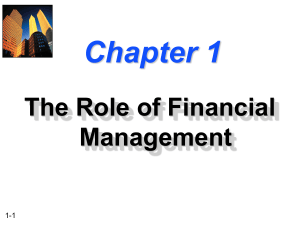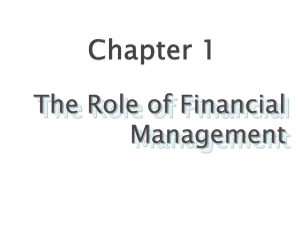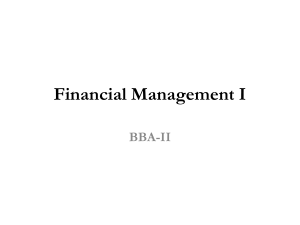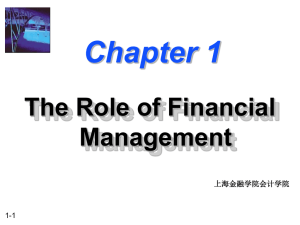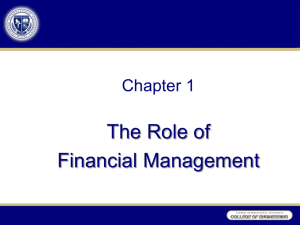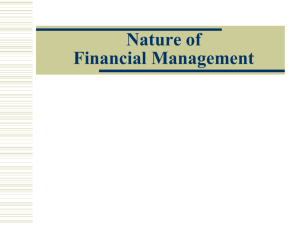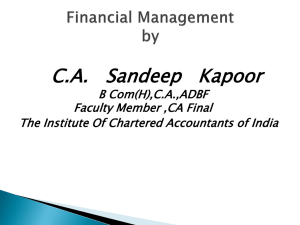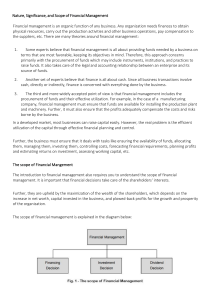Chapter 1 -- The Role of Financial Management
advertisement
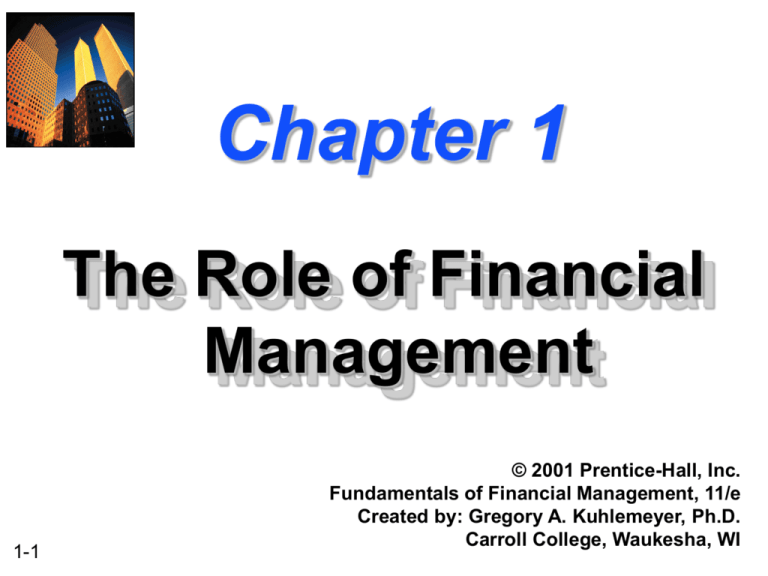
Chapter 1 The Role of Financial Management 1-1 © 2001 Prentice-Hall, Inc. Fundamentals of Financial Management, 11/e Created by: Gregory A. Kuhlemeyer, Ph.D. Carroll College, Waukesha, WI The Role of Financial Management 1-2 What is Financial Management? The Goal of the Firm Organization of the Financial Management Function What is Financial Management? Concerns the acquisition, financing, and management of assets with some overall goal in mind. 1-3 Investment Decisions Most important of the three decisions. 1-4 What is the optimal firm size? What specific assets should be acquired? What assets (if any) should be reduced or eliminated? Financing Decisions Determine how the assets (LHS of balance sheet) will be financed (RHS of balance sheet). What is the best type of financing? What is the best financing mix? What is the best dividend policy? How 1-5 will the funds be physically acquired? Asset Management Decisions How do we manage existing assets efficiently? Financial Manager has varying degrees of operating responsibility over assets. Greater emphasis on current asset management than fixed asset management. 1-6 What is the Goal of the Firm? Maximization of Shareholder Wealth! Value creation occurs when we maximize the share price for current shareholders. 1-7 Shortcomings of Alternative Perspectives Profit Maximization Maximizing a firm’s earnings after taxes. Problems 1-8 Could increase current profits while harming firm (e.g., defer maintenance, issue common stock to buy T-bills, etc.). Ignores changes in the risk level of the firm. Shortcomings of Alternative Perspectives Earnings per Share Maximization Maximizing earnings after taxes divided by shares outstanding. Problems Does not specify timing or duration of expected returns. Ignores Calls 1-9 changes in the risk level of the firm. for a zero payout dividend policy. Strengths of Shareholder Wealth Maximization Takes account of: current and future profits and EPS; the timing, duration, and risk of profits and EPS; dividend policy; and all other relevant factors. Thus, share price serves as a barometer for business performance. 1-10 The Modern Corporation Modern Corporation Shareholders Management There exists a SEPARATION between owners and managers. 1-11 Role of Management Management acts as an agent for the owners (shareholders) of the firm. 1-12 An agent is an individual authorized by another person, called the principal, to act in the latter’s behalf. Agency Theory Jensen and Meckling developed a theory of the firm based on agency theory. Agency Theory is a branch of economics relating to the behavior of principals and their agents. 1-13 Agency Theory Principals must provide incentives so that management acts in the principals’ best interests and then monitor results. Incentives include stock options, perquisites, and bonuses. 1-14 Social Responsibility Wealth maximization does not preclude the firm from being socially responsible. Assume we view the firm as producing both private and social goods. Then shareholder wealth maximization remains the appropriate goal in governing the firm. 1-15 Organization of the Financial Management Function Board of Directors President (Chief Executive Officer) Vice President Operations 1-16 VP of Finance Vice President Marketing Organization of the Financial Management Function VP of Finance 1-17 Treasurer Controller Capital Budgeting Cash Management Credit Management Dividend Disbursement Fin Analysis/Planning Pension Management Insurance/Risk Mngmt Tax Analysis/Planning Cost Accounting Cost Management Data Processing General Ledger Government Reporting Internal Control Preparing Fin Stmts Preparing Budgets Preparing Forecasts Texas Instruments BAII+ Integrated throughout the chapters A useful financial tool Does NOT replace financial understanding 1-18 Change Display Setting Change the decimal places displayed from “2” to “Floating” Press: 1-19 2nd Format 9 ENTER 2nd QUIT Change Periods per Year Setting Change the periods per year from “12” to “1” Press: 1-20 2nd P/Y 1 ENTER 2nd QUIT
